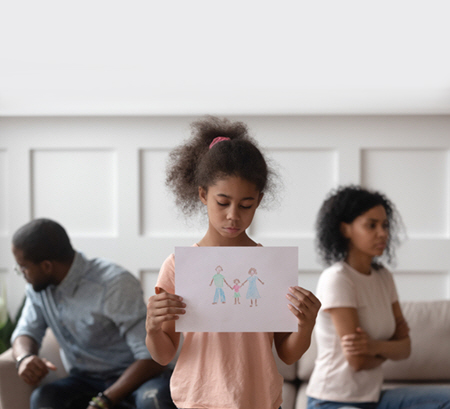 Trauma can leave a lasting impact on your child.
Trauma can leave a lasting impact on your child.
What is trauma? Has my child experienced trauma? Is trauma negatively impacting my child?
If you’ve asked yourself any of these questions, you likely have a child who has experienced emotional distress related to a traumatic event.
Some traumatic events are apparent – the death of a loved one, separation from a caregiver, abuse, or bullying. Other traumatic events may be less obvious, such as moving to a new home, financial hardship, or parents fighting. When your child reacts to a traumatic event that impacts daily living, your child is likely to experience traumatic stress.
If your child is experiencing traumatic stress, you might notice a change in their behavior, such as irritability, anxiety, withdrawal, or developmental regression. These symptoms may show up weeks or months after the traumatic event and last for several months or more.
The impact of childhood trauma can follow your child into their adulthood if left untreated.
 Here’s a description of how we treat childhood trauma.
Here’s a description of how we treat childhood trauma.
You may be wondering what trauma treatment involves. Therapy for children and adolescents who have experienced trauma involves both the child and a supportive caregiver.
Your child will have individual sessions where they learn skills to relax and manage their emotions to remain safe when experiencing trauma triggers. Once your child effectively implements relaxation strategies into their daily routine, they will begin to share the story of their trauma experience. This story is likely to be very scary for your child, as they will share intimate details of what is likely the scariest thing they have ever experienced.
Since your child will be exposing their emotional wound, they must have a supportive caregiver who responds to their experience in ways that are helpful to your child’s healing. Therefore, I will meet separately with you (or the designated support person), so you can process your thoughts and feelings related to your child’s experience.
Together, we can discuss ways that you can verbally and nonverbally offer your child support as they share the details of their experience with you. Once you become prepared, you and your child meet together in the therapy room. Your child will have the opportunity to share his experience with you, and you will have the opportunity to provide your child with the support they need to heal their emotional distress.
Trauma doesn’t need to be the narrative of your child’s life.
Therapy can help both you and your child identify the source of their trauma and begin sharing the experience.
Learning how to address trauma helps you help your child’s healing process.
The impact of therapy can change the direction of your child’s future. Give me a call today at (336) 289-4492.

